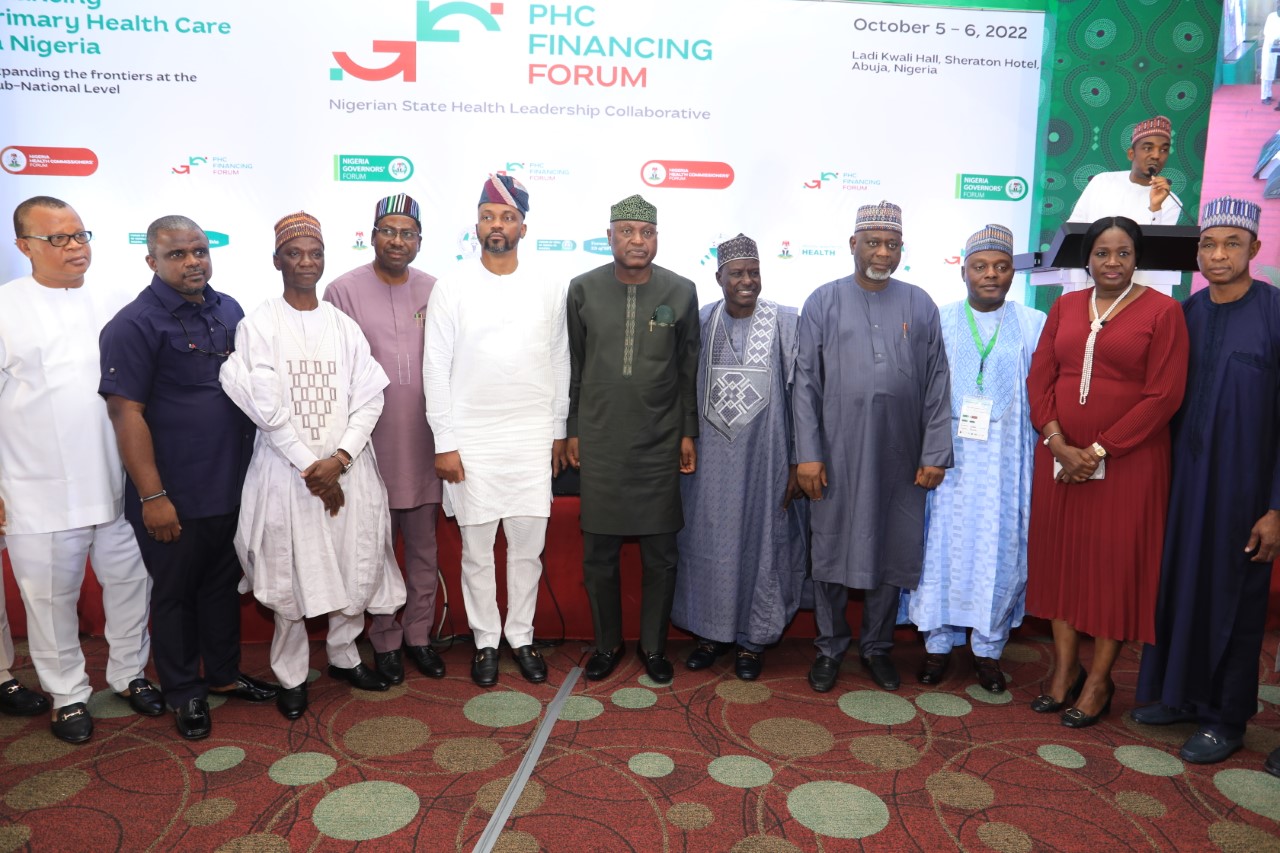From the ‘Re-imagining Primary Health Care’ summit in April 2022 to the commitment made by the Nigeria Governors’ Forum (NGF) — in August of the same year to increase funding for primary health care and recently, the Primary Health Care (PHC) Financing Forum in October, Nigeria’s PHC system appears to be receiving a great deal more attention. Primary health care is the foundation of healthcare delivery and is key to the achievement of universal health coverage (UHC), the very fact that this attention is focused on financing, is a welcome development.
Expanding frontiers
The PHC Financing Forum is an annual gathering hosted by commissioners to share, showcase and highlight state level performance and accountability for primary healthcare. The two-day conference, organised by the Nigeria Health Commissioners’ Forum, in collaboration with the Nigeria Governor’s Forum, was themed, “Expanding the frontiers at the sub-national level”. Conversations at the forum brought together health sector stakeholders in the public and private sector, development partners and academic institutions and revolved around,
- Emerging insights on comprehensive PHC financing
- Mobilising and securing allocation of resources for PHC at sub national level
- Basic Healthcare Provision Fund (BHCPF) implementation — early insights and lessons, and
- Pooling and benefit package design
Here are four key take aways from the discussions at the forum:
A quest for alternative funding for health
An analysis of the global measures for health expenditure indicates that Nigeria is far below the funding ladder. Available data shows that government expenditure per capita, expenditure per Gross Domestic Product (GDP) and 2021 health allocations stand at 11 USD, less than 1% and 3.76%, respectively. Households out of pocket expenditure accounts for over 70% of the total health expenditure, which has severe consequences, pushing many Nigerians into poverty when they fall sick.
Not only would universal health coverage ensure that individuals and communities receive the health services they need, it also ensures that they are protected from experiencing financial hardship. The COVID-19 pandemic and the ongoing Russia-Ukraine crisis has triggered an economic crisis that has impacted Nigeria’s oil revenue, affecting its ability to fund different key sectors of the economy. There is therefore a need to look for alternative sources of funding if the momentum towards achieving universal Health coverage is to be sustained.
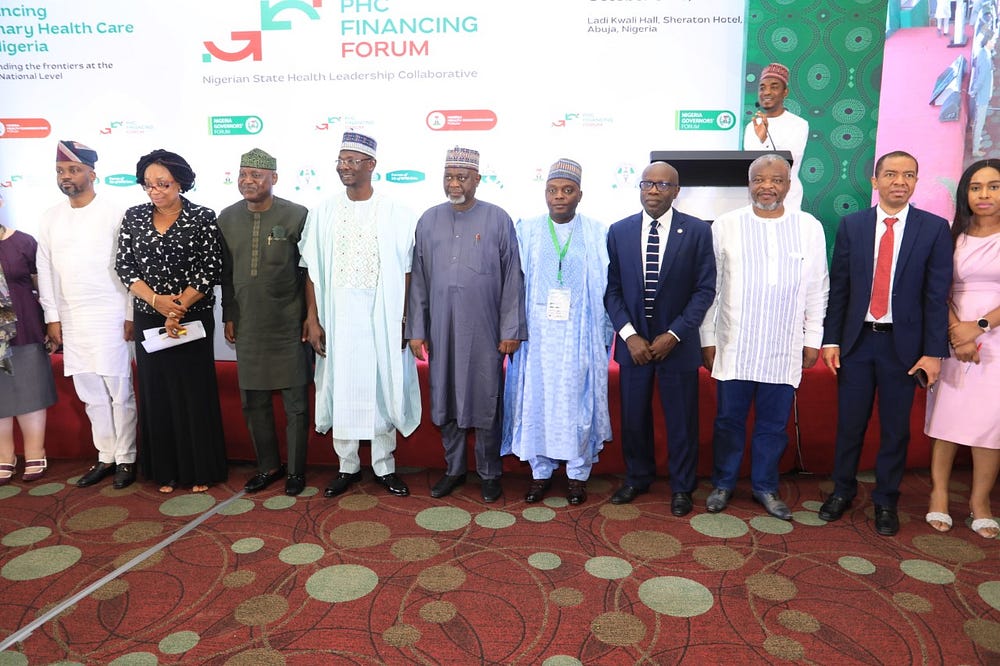
His Excellency, Governor Abdullahi Sule, Governor, Nasarawa State speaking on behalf of the Chairman, Nigeria Governors Forum said that Nigeria’s PHC system will be in trouble if other options for financing care at the primary healthcare level are not explored. “Nigeria has so many other options and there is so much money sitting in so many places, but we must find a way to bring out those monies to fund PHC because if we don’t, we are in trouble”. Besides the need to increase the proportion of funds allocated to health, he made a case for taxes from sugar sweetened beverages (SSBs) and funds generated from the importation of used cars to be allocated to healthcare in Nigeria. The consumption of potentially harmful goods like SSBs contribute to Nigeria’s disease burden. It is therefore logical to allocate these funds towards efforts to reduce the burden.
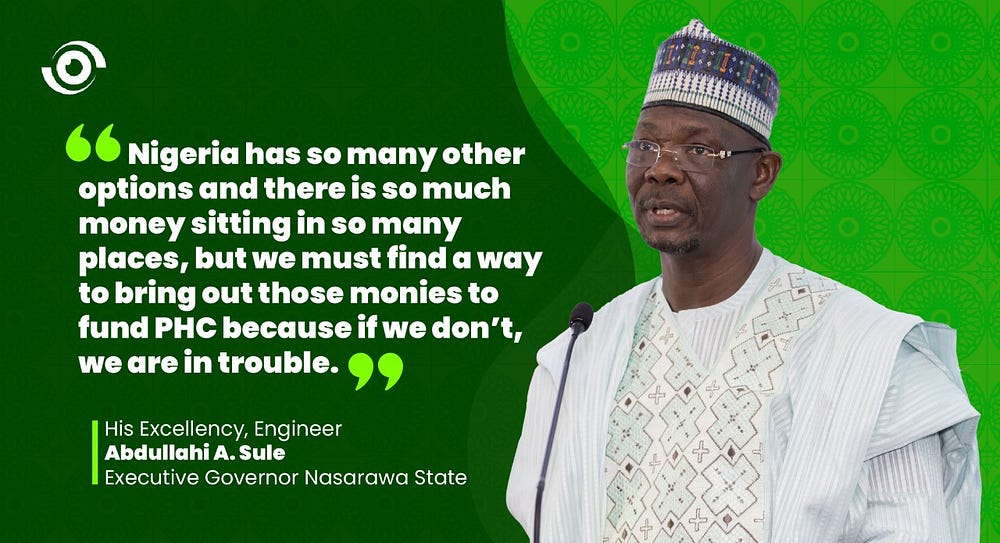
Remarking on the call for more financing mechanisms for primary healthcare, Ben Akabueze, Director General, Budget Office of the Federation revealed that the Federal Ministry of Health returns unspent funds to the federation account yearly and there is a need to better understand the underlying reasons. Potential reasons could include delays in approvals, disbursement and cash backing from the Ministry of Finance, Budget and National Planning. It underscores the need for the Ministry of Health to commence all procurement processes early and prompt approvals and releases of all allocated funds by the relevant Ministries. While also highlighting the need to ensure that increased allocation of resources to health, translate to efficient and transparent utilisation.
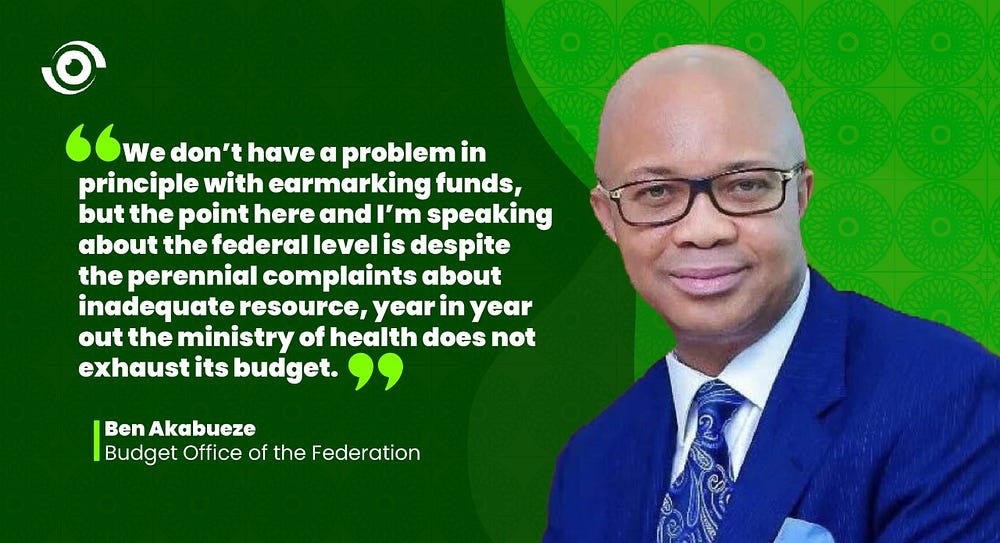
Accountability in health spending: the implementation of the Basic Healthcare Provision Fund (BHCPF)
The BHCPF was established to strengthen primary healthcare through the 1% Consolidated Revenue Fund (CRF). Since implementation, there have been fiscal transfers from the federal government to health facilities through the National Health Insurance Authority (NHIA) and National Primary Health Care Development Agency (NPHCDA) gateway.
The BHCPF ministerial oversight committee represented by Dr Chris Osa Isokpunwu noted that as of October 2022, 98 billion naira has been received for the BHCPF, out of which 53 billion naira has been disbursed to states for programme implementation. Responding to the question as to how this disbursement has been accounted for, Dr Isokpunwu said “Through the NHIS gateway, about 1.1 million beneficiaries have been enrolled in the BHCPF, out of which about 900,000 of them have started accessing care in 28 states.”
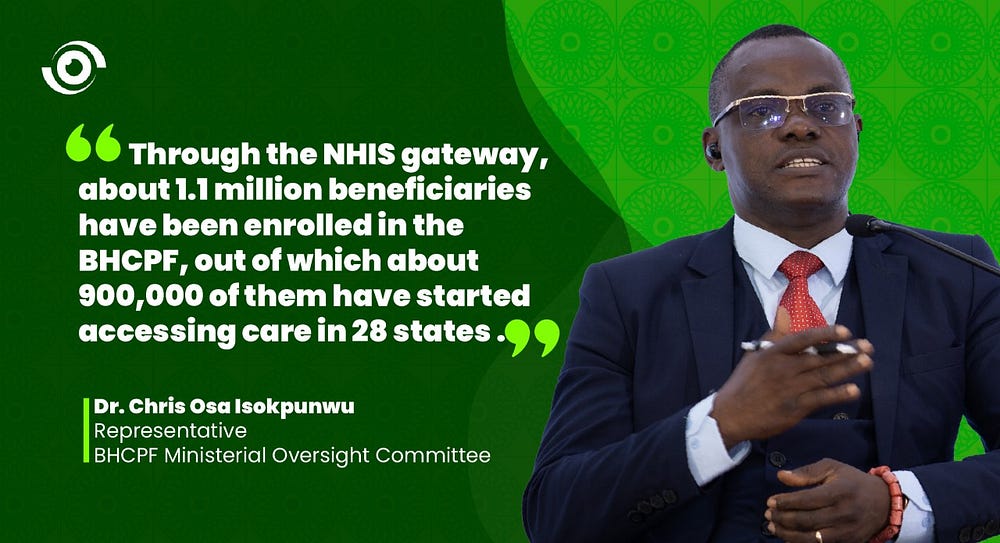
With over 80 million people living below the poverty line, state governments need to do more to ensure that more beneficiaries are enrolled. This will guarantee medical cover in the event of a health emergency, as well as protection from catastrophic health expenditures.
Integrating individual primary healthcare and Essential Public Health Functions (EPHF) in the primary healthcare system
Essential Public Health functions are carried out at distinct levels of the health system — federal, state, and local government; and financing, especially at the community level has become a challenge. Dr. Oyebanji Filani, Honourable Commissioner for Health & Human Services, Ekiti State and Chairman of the Health Commissioners Forum highlighted these challenges in the case of Ekiti State which includes, fragmented funding sources and poor flexibility in spending on health emergencies due to restrictions within the public finance management rules.

The challenges listed above are not peculiar to Ekiti State alone as other Honorable Commissioners for Health present at the event alluded to the same challenges associated with delivering a comprehensive primary healthcare system. Therefore, it is imperative that health commissioners collectively take the lead when it comes to harmonising PHC funding streams for both individual care and essential public health functions at the sub-national level, to achieve the desired health outcomes.
Increasing resource pooling and benefit package for healthcare
Resource pooling is a viable mechanism for funding care at the primary health level. However, despite its enormous benefits a number of challenges have affected its implementation in Nigeria. According to Dr Ben Nkechukwa, Executive Secretary Delta State Health Insurance Agency, some of these challenges are poor integration of health insurance schemes in Nigeria, inability to determine services based on available resources as well as mapping out health facilities with the capacity to deliver services. “There are several programs running as health insurance schemes in Nigeria, but there is no integration. The whole idea of health insurance started with the National Health Insurance Scheme and then decentralisation to states, but it stopped, and all states were not carried along at the same pace. Also, we did not determine what we need to cover based on available resources,” he added.

Making recommendations to address these challenges, Dr Nkata Chukwu, Founding Partner, Health Systems Consult (HSCL) said “We need to begin to think of how the BHCPF and the support from the national could drive the state pools towards one large solid pool rather than creating opportunities for fragmentation.” There is a need to have a common basic package of health services for all Nigerians that will promote the best cross-subsidisation for health insurance rather than having different packages for fewer people. He added that the idea of having a single pool is good, however the target population as in the case of the BHCPF may be different from the state social health insurance schemes. States should therefore begin to align both programs and create incentives that will attract citizens to enroll in the scheme.
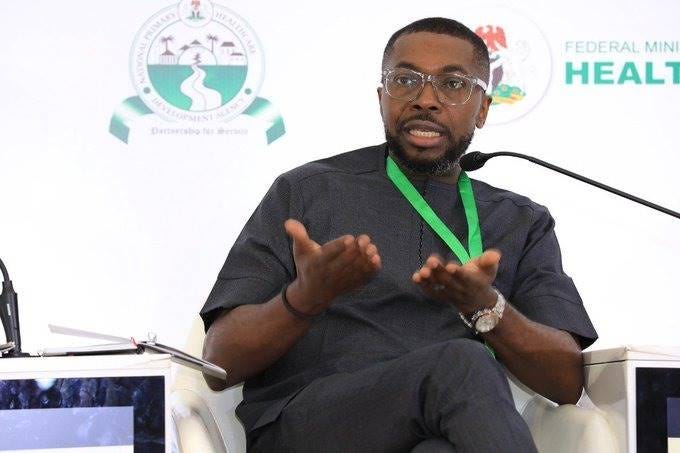
Adequate funding is essential for a well-functioning health system. Its lack thereof negatively impacts service delivery of any health system, including primary healthcare. In July, One Campaign launched a PHC assessment report which was conducted using 20 indicators including, budgetary allocation and release. Among other things, it revealed that a good number of states were not doing so well in the areas of budgeting, health worker density and community members experience. An underfunded PHC will be ill equipped and hard pressed to perform optimally which will encourage inequity and drive the nation further away from achieving ‘Health for All’. For Nigeria to achieve UHC, it must prioritise its primary healthcare system including its financing mechanisms. The PHC Financing Forum has distilled great ideas on how to make this happen. Executive Governors and Health Commissioners must now work to implement them.


